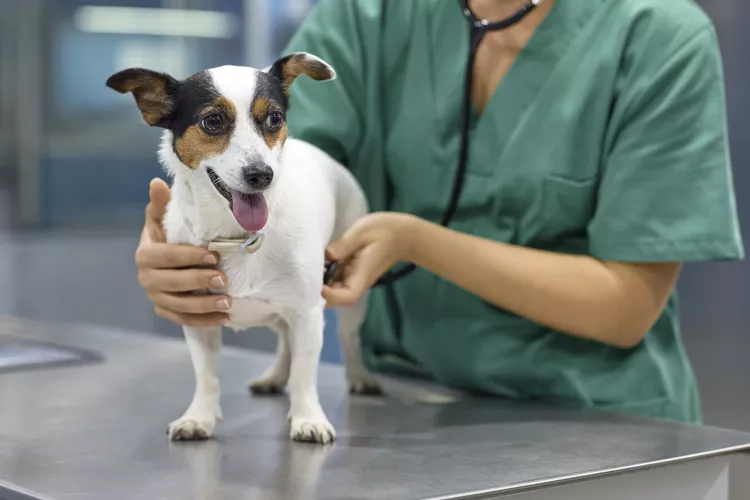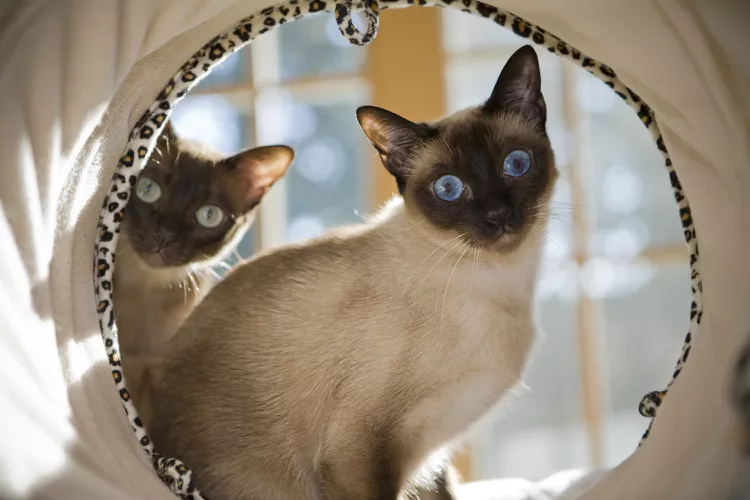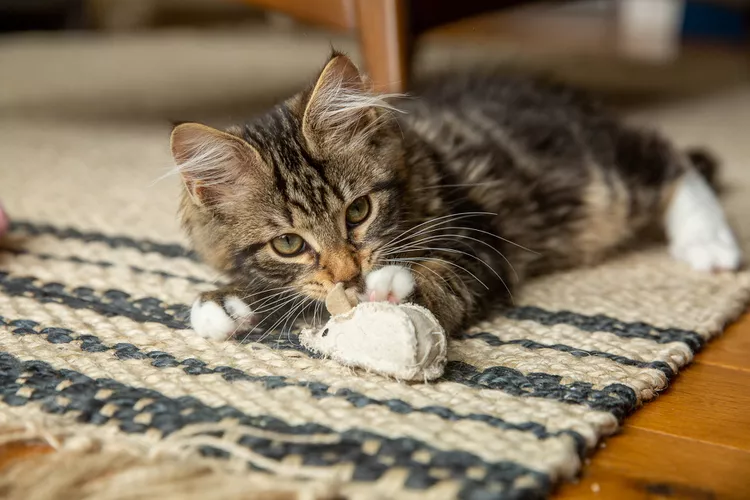
If your cat is chewing on electrical cords, it's immediate cause for concern. The behavior may be caused by an obsessive-compulsive disorder (OCD), or other environmental or health-related factors, such as stress or a dental issue.
No matter the cause, it's dangerous for cats to chew on electrical cords, not to mention this activity can destroy your electrical appliances and cords. Fortunately for you and your cat, you can stop your cat from chewing on electrical cords with protective coverings by offering alternative items for chewing or by addressing the underlying causes.
There's some mystery surrounding why cats choose electrical cords to chew on. One theory is that the cord resembles another animal's tail and that basic feline instinct compels the cat to attack anything that looks like a tail—although this reasoning doesn't address why the cat would continue to chew the cord once it discovers there's no animal attached. Additional reasons for cord chewing may include:
Obsessive-compulsive disorders (OCD) that involve chewing and gnawing behavior most often develop in Siamese and Burmese cats. These felines may develop a strong urge to chew, suck, and sometimes even eat inedible objects.
Although cord chewing may be the primary OCD behavior you observe in your cat, you may spot other symptoms as well. There doesn't seem to be an explanation for why some cats develop a particular combination of OCD symptoms.
Cats that have pain in their mouths caused by dental problems may indulge in gnawing behavior in an attempt to relieve the discomfort. Between 50% and 90% of cats older than four years of age suffer from some form of dental disease, so it's important to address this proactively with regular veterinary dental care, including checkups and cleanings.
If your cat is older, it may have a combination of issues that prompt chewing behavior. As they age, it's common for cats to develop osteoarthritis, which can result in a drastic reduction in their activity level. When a cat isn’t able to move around and exercise, explore, or interact as much with the world, boredom and the resulting stress may cause it to seek other outlets.
At an older age, there may also be metabolic issues, such as hyperthyroidism, that raise a cat's activity level and increase its urge to gnaw. A blood screening panel may reveal a treatable issue that resolves the chewing behavior.
Pica is defined as craving and chewing substances that have no nutritional value. Some examples include paper, dirt, hair ties, plastic, and other common household items. While iron deficiency and malnutrition can be causes of pica, in cats, the issue is most often associated with boredom, anxiety, and other underlying behavior-related concerns.
Stress can prompt a wide range of odd behaviors. In these cases, the chewing serves to relieve anxiety and simply makes the cat feel better emotionally.
Take your cat to the veterinarian for a checkup if it displays inappropriate chewing behavior so that any underlying health or behavioral problems can be discovered and addressed. In the meantime, take steps to keep your cat safe.

10 Obscure, Little-known Canine Facts in Honor of National Dog Day
With National Dog Day upon us, it's time to celebrate everything about our favorite pets—even the weirder stuff. Here are 10 obscure facts about dogs you probably didn't know.
Exploring the Different Types of Pet-Friendly Beaches
Are you looking for pet-friendly beaches? Learn about the different types of pet-friendly beaches, their locations, and tips for visiting them with your pet.
Toxic Chemicals & Household Items That Can Poison Dogs
There are many things in and around your home that can endanger your dog. Learn which chemicals and household items can poisin your dog.
Bronchitis in Dogs
Is your dog coughing and feeling unwell? It could be due to respiratory inflammation called bronchitis. Learn the causes, treatment, and prevention.
Choking in Dogs
A dog can occasionally swallow something incorrectly and start choking. Find out how you can tell if your dog is choking and what you can do about it.
Why Does My Dog Smell So Bad?
Does your dog smell? Find out what could be causing these unpleasant odors and if it's something that needs more than just a bath to fix.
Is Rosemary Safe for Dogs?
Rosemary is used both for cooking and as a supplement with many reported health benefits in people, so you may be wondering if it is safe to give to your dog. Rosemary is considered non-toxic for dogs but with some caveats.
Can Dogs Eat Blueberries?
Dogs can safely eat blueberries. Blueberries are packed with nutrients and can be a great addition to your dog's diet when fed in moderation. Learn more about the benefits, risks, how to incorporate blueberries into their diet, and other fruits dogs can eat.
Dog Food Basics
Are you feeding your dog the best way possible? Check out these dog feeding tips to keep your dog healthy and happy.
Swedish Vallhund: Dog Breed Characteristics & Care
The Swedish vallhund makes for a high-energy and affectionate companion. Learn about the breed's history, health, exercise needs, and more.
Becoming a Show Dog: Getting Started
Do you have the perfect puppy? Have you considered showing her in a dog show? There's much more to showing than showing up! Here's how to get started.
How to Care for a Hairless Cat
Hairless cats make great pets but they aren't without their own challenges and requirements. Read on to learn how to best care for your furless feline.
British Shorthair: Breed Profile, Characteristics & Care
The British Shorthair is a calm, affectionate cat that looks and feels like a plush teddy bear. Here's what you need to know about this popular breed, including appearance, temperament, health, and care.
Tonkinese: Cat Breed Profile, Characteristics & Care
The Tonkinese cat is a perfect mix of the Siamese and Burmese—smart, sociable, and sweet. Learn about the Tonkinese breed.
How to Stop Your Cat From Chewing Electrical Cords
Cats are known to pounce and attack inanimate objects, like electrical cords. Learn how to prevent your cat from ambushing objects that may harm it.
How to Stop Aggression in Kittens
Kittens may show aggressive behavior for several reasons. Sometimes their play gets too aggressive while other times the kitten is afraid or upset. Learn how to spot and curb aggression in kittens.
46 Egyptian Cat Names
Whether inspired by notable Egyptian deities, locales, or pharaohs, Egyptian cat names can bring out the divinity of your noble feline companion.
How to Tell If a Kitten is a Boy or a Girl
If you're wondering whether your new kitten is a boy or a girl, here are three ways to help determine the sex of your cat.
Signs Your Cat Is Aging and When to See the Vet
Expect some changes when your cat ages. Learn to differentiate between normal and potential medical problems for your elderly cat.
Coronavirus in Cats
Feline coronavirus (FCoV) rarely harms cats but can lead to another life-threatening illness. Learn the causes, treatment, and prevention.